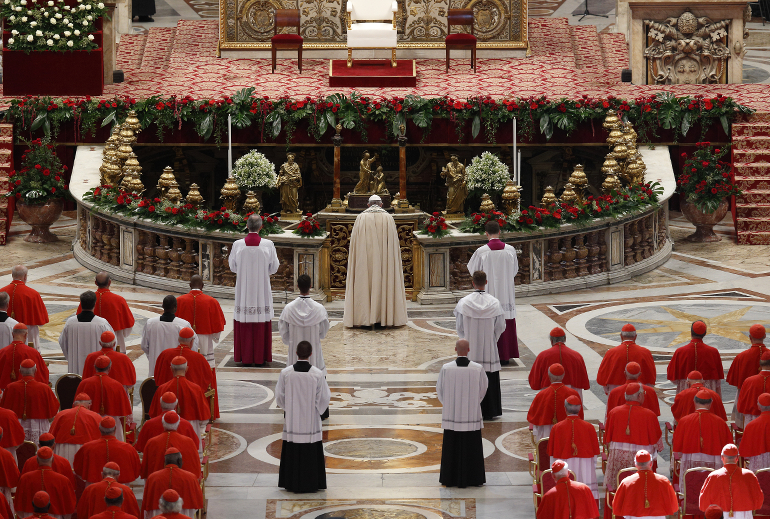
Pope Francis prays in St. Peter's Basilica during the 2017 consistory in which he created five new cardinals (CNS photo/Paul Haring)
Pope Francis named fourteen new Catholic cardinals May 20, again diversifying representation in the most elite body of church prelates with selections from places as far-flung as Iraq, Pakistan and Japan and solidifying his influence on the group that will one day elect his successor.
In a surprise announcement at the end of his traditional Regina Coeli prayer with crowds in St. Peter's Square, the pontiff said he would install the new cardinals during a consistory at the Vatican June 29.
As the pope began to give the names of those he would make cardinals, the first pronounced was notable: Chaldean Patriarch Louis Raphaël I Sako, an Iraqi who often speaks publicly about the suffering his people have encountered after the U.S.-led invasion of their country in 2003.
Others named included Karachi, Pakistan Archbishop Joseph Coutts; Huancayo, Peru Archbishop Pedro Barreto; Toamasina, Madagascar Archbishop Desire Tsarahazana; and Osaka, Japan Archbishop Thomas Aquinas Manyo Maeda.
Francis also named four Vatican officials: Luis Ladaria, head of the Congregation for the Doctrine of the Faith; Angelo De Donatis, vicar general of the Rome diocese; Giovanni Becciu, second-in-command at the Secretariat of State; and Konrad Krajewski, head of the pope's charity office.
Eleven of the 14 cardinals named by the pope are under the age of 80, meaning they will join the ranks of cardinal electors, or those who are tasked with gathering in conclave after the death or resignation of the pontiff to select his successor.
The June 29 ceremony adding the new cardinals will mark the first time in his five-year papacy that Francis has appointed a plurality of the prelates who will one day choose who succeeds him as head of the global Catholic Church.
After the ceremony, Francis will have named 59 of 125 cardinal electors. Forty-seven of the remaining electors were named by retired Pope Benedict XVI; 19 by John Paul II.
The two other cardinal electors named by Francis May 20 are Leiria-Fatima, Portugal Bishop Antonio dos Santos Marto; and L'Aquila, Italy Archbishop Giuseppe Petrocchi.
Of the choices of Vatican officials, each is notable for their direct connection to Francis. The pontiff appointed Ladaria to lead the doctrinal congregation in June 2017; De Donatis to the Rome diocese role in May 2017; and Krajewski to lead his charity efforts in August 2013.
Becciu was made the pope's "special delegate" to the Knights of Malta in February 2017 after the public dispute between the sovereign order and the Vatican, despite the fact that U.S. Cardinal Raymond Burke was and, still is, serving as the order's official spiritual patron.
Several of the pope's other choices bring cardinals to countries that have not been represented in the College of Cardinals in a long time.
Japan has not had a cardinal since the death of Vatican official Stephen Hamao in 2007; Pakistan since the death of Karachi Archbishop Joseph Cordeiro in 1994; Madagascar since the death of Antananarivo Archbishop Armand Razafindratandra in 2010.
June's consistory will be Francis' fifth. His most recent was in June 2017, when he created five new cardinals, including San Salvador Auxiliary Bishop Jose Gregorio Rosa Chavez, a close associate of slain Archbishop Oscar Romero.
The pope also named three cardinals over the age of 80 May 20 to offer them a special recognition: retired Xalapa, Mexico Archbishop Sergio Obeso Rivera; retired Corocoro, Bolivia Bishop Toribio Ticona Porco; and Claretian Fr. Aquilino Bocos Merino, a popular Spanish spiritual author.
Francis is expected to have a large impact on the composition of the College of Cardinals in 2019, as ten more cardinals will turn 80 throughout the year.
By the end of next summer, those aging out will include: Alberto Suarez, Archbishop emeritus of Morelia, Mexico; Orlando Quevedo, Archbishop of Cotabato, Philippines; Edwin O'Brien, Grand Master of the Order of the Holy Sepulchre; Stanislaw Dziwisz, Archbishop emeritus of Krakow, Poland; and, John Tong Hon, Bishop emeritus of Hong Kong.
At the end of 2019, added to the list will be: Sean Brady, Archbishop emeritus of Armagh, Ireland; Laurent Monsengwo, Archbishop of Kinshasa, Democratic Republic of the Congo; Zenon Grocholewski, former prefect of the Congregation for Catholic Education; Edoardo Menichelli, Archbishop emeritus of Ancona-Osimo, Italy; and, Telesphore Toppo, Archbishop of Ranchi, India.
Francis named the new cardinals May 20 after celebrating Mass for the feast of Pentecost, when Catholics mark Jesus' sending forth of the Holy Spirit upon the disciples, giving them the task of going among the people and forgiving sins.
"The Spirit frees hearts chained by fear," the pontiff said in his homily. "It overcomes all resistance. To those content with half measures he inspires whole-hearted generosity. It opens hearts that are closed. It impels the comfortable to go out and serve."
[Joshua J. McElwee is NCR Vatican correspondent. His email address is jmcelwee@ncronline.org. Follow him on Twitter: @joshjmac.]
Advertisement







